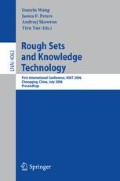Abstract
Method based on extension rule is a new method for theorem proving, whether or not it will behave well in theorem proving depends on the efficiency. Moreover, the efficiency of propositional extension rule will affect that of first order extension rule directly. Thus the efficiency of the propositional extension rule is very important. ER and IER are two extension rule methods Lin gave. We have improved the ER method before. In order to increase the efficiency of IER, this paper improves IER by some reduction rules. And then the soundness and completeness of it is proved. We also report some preliminary computational results.
Access this chapter
Tax calculation will be finalised at checkout
Purchases are for personal use only
Preview
Unable to display preview. Download preview PDF.
References
Robinson, J.A., et al. (eds.): Handbook of Automated Reasoning. Elsevier Science Publishers, Amsterdam (2002)
Fenkam, P., Jazayeri, M., Reif, G.: On methodologies for constructing correct event-based applications. In: Proc. of 3rd International Workshop on Distributed Event-Based Systems, Edinburgh, UK, pp. 38–43 (2004)
Kubica, J., Rieffel, E.G.: Collaborating with a genetic programming system to generate modular robotic code. In: Proc. of Genetic and Evolutionary Computation Conference, New York, USA, pp. 804–811 (2002)
Lin, H., Sun, J.G., Zhang, Y.M.: Theorem proving based on extension rule. Journal of Automated Reasoning 31, 11–21 (2003)
Wu, X., Sun, J.G., Lu, S., Yin, M.H.: Propositional extension rule with reduction. IJCSNS International Journal of Computer Science and Network Security 6, 190–195 (2006)
Davis, M., Putnam, H.: A computing procedure for quantification theory. Journal of the ACM 7, 201–215 (1960)
Liu, X.H.: The theorem proof based on resolution (in Chinese). Science Press, Beijing (1994)
Dechter, R., Rish, I.: Directional resolution: The Davis-Putnam procedure, revisited. In: Proc. of 4th International Conference on Principles of KR&R, Bonn, Germany, pp. 134–145 (1994)
Author information
Authors and Affiliations
Editor information
Editors and Affiliations
Rights and permissions
Copyright information
© 2006 Springer-Verlag Berlin Heidelberg
About this paper
Cite this paper
Wu, X., Sun, J., Lu, S., Li, Y., Meng, W., Yin, M. (2006). Improved Propositional Extension Rule. In: Wang, GY., Peters, J.F., Skowron, A., Yao, Y. (eds) Rough Sets and Knowledge Technology. RSKT 2006. Lecture Notes in Computer Science(), vol 4062. Springer, Berlin, Heidelberg. https://doi.org/10.1007/11795131_86
Download citation
DOI: https://doi.org/10.1007/11795131_86
Publisher Name: Springer, Berlin, Heidelberg
Print ISBN: 978-3-540-36297-5
Online ISBN: 978-3-540-36299-9
eBook Packages: Computer ScienceComputer Science (R0)

